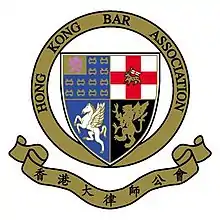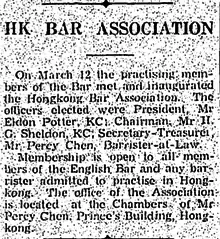Hong Kong Bar Association
The Hong Kong Bar Association (HKBA) is the professional regulatory body for barristers in Hong Kong. The Law Society of Hong Kong is the equivalent association for solicitors in Hong Kong.
香港大律師公會 | |
 | |
| Formation | 12 March 1948 |
|---|---|
| Legal status | Society under the Societies Ordinance |
| Headquarters | LG2, High Court, 38 Queensway, Hong Kong |
Region served | Hong Kong |
Chairman | Paul Harris SC |
| Website | hkba |
| Hong Kong Bar Association | |||||||||||||
|---|---|---|---|---|---|---|---|---|---|---|---|---|---|
| Traditional Chinese | 香港大律師公會 | ||||||||||||
| Simplified Chinese | 香港大律师公会 | ||||||||||||
| |||||||||||||
Philip Dykes SC is the current chairman of the Council of the HKBA.
History

According to its website, the Hong Kong Bar Association was founded in 1949.[1] However, a newspaper advertisement from March 1948 records the foundation of the association on 12 March 1948 with Mr Eldon Potter KC being elected President, Mr H.D. Sheldon KC being elected chairman and Mr Percy Chen being elected Secretary Treasurer. The offices of the Association were located in the offices of Mr Chen in Prince's Building, Hong Kong.[2]
Role
The objects of the Hong Kong Bar Association are generally to consider and to take proper action on all matters affecting the legal profession and the administration of justice. These include:
- the maintenance of the honour and independence of the Bar;
- the improvement of the administration of justice in Hong Kong;
- the prescribing of rules of professional conduct, discipline and etiquette;
- furtherance of good relations and understanding within the legal profession.
Like other professional bodies, the HKBA has the authority to take disciplinary action to the members who breach the Code of Conduct of the Association. The Law Society of Hong Kong is the equivalent association for solicitors in Hong Kong.
Route to entry

Students must first complete a basic degree in law, such as the Bachelor of Laws (LLB), Juris Doctor (JD) or convert from another first degree with the Common Professional Examination (CPE).
They must then complete the Postgraduate Certificate in Laws (PCLL) at The University of Hong Kong, the City University of Hong Kong or The Chinese University of Hong Kong. From 2008 onwards, all overseas applicants to the PCLL must satisfy each element of the PCLL conversion programme.
After finishing PCLL, prospective barristers will enter pupillage with a pupilmaster for a year; after half a year they will gain rights of audience in court.
Overseas barristers may, having at least three years' experience, take the Barristers Qualification Examination to officially become a Hong Kong barrister.[3]
Additionally, lawyers of at least three years' qualified experience may apply to switch membership of either the HKBA or The Law Society of Hong Kong. However, one may not enjoy membership of both entities at once. For example, the No. 1 ranked barrister in seniority in 2007, Sir John Swaine SC, switched to become a solicitor in 2002, but switched back in 2004. Solicitors seeking to qualify as barrister are required to do pupillage, however, the period may be shortened for those with substantial advocacy experience.[4]
Number of practising barristers
As of December 2017, there were 99 Senior Counsel (88 male, 11 female), and 1,326 (914 male, 412 female) junior barristers in practice at the private bar in Hong Kong.[5] There were 89 pupil barristers of whom 53 were male and 36 female.[6]
Senior Counsel
After gaining ten years' experience as a barrister or government counsel in Hong Kong, a barrister admitted in Hong Kong may apply to become a Senior Counsel (SC) (資深大律師).[7] Time in practice as a barrister or lawyer in another jurisdiction or as a solicitor in private practice in Hong Kong does not count.[8] The Law Society of Hong Kong has called for this to be changed, so that solicitors may also be appointed Senior Counsel.[9]
In colonial Hong Kong before 1997, the title was instead Queen's Counsel (QC) (御用大律師). After the transfer of sovereignty, Queen's Counsel who had been appointed QC in HK or British Queen's Counsel who had been admitted to practice in Hong Kong generally prior to the handover became Senior Counsel automatically.[10]
List of chairpersons
By year:
- 1948 Eldon Potter KC, President, Harold Sheldon KC, Chairman
- 1949 Harold Sheldon KC
- 1950 Charles Loseby KC
- 1951 Leo D'Almada KC
- 1952 John McNeill KC/QC
- 1953 Charles Loseby QC
- 1954 Leo D'Almada QC
- 1955 John McNeill QC
- 1956 John McNeill QC
- 1957 Leo D'Almada QC
- 1958 John McNeill QC
- 1959 Leo D'Almada QC
- 1960 Lo Hin Shing
- 1961 Leo D'Almada QC
- 1962 Leo D'Almada QC
- 1963 Brook Bernacchi QC
- 1964 S.V. Gittins
- 1965 S.V. Gittins
- 1966 Oswald Cheung QC
- 1967 S.V. Gittins QC
- 1968 Gerald de Basto QC
- 1969 Gerald de Basto QC
- 1970 Gerald de Basto QC
- 1971 Henry Litton QC
- 1972 Henry Litton QC
- 1973 Gerald de Basto QC
- 1974 Archie Zimmern QC
- 1975 Charles Ching QC
- 1976 Charles Ching QC
- 1977 Henry Litton QC
- 1978 Henry Litton QC
- 1979 Henry Litton QC
- 1980 Martin Lee QC
- 1981 Martin Lee QC
- 1982 Martin Lee QC
- 1983 Henry Litton QC
- 1984 Henry Litton QC
- 1985 Denis Chang QC
- 1986 Denis Chang QC
- 1987 Denis Chang QC
- 1988 Robert Tang QC
- 1989 Robert Tang QC
- 1990 Anthony Rogers QC
- 1991 Anthony Rogers QC
- 1992 Jacqueline Leong QC
- 1993 Jacqueline Leong QC
- 1994 Ronny Wong QC
- 1995 Gladys Li QC
- 1996 Gladys Li QC
- 1997 Audrey Eu QC, SC
- 1998 Audrey Eu SC
- 1999 Ronny Tong SC
- 2000 Ronny Tong SC
- 2001 Alan Leong SC
- 2002 Alan Leong SC
- 2003 Edward Chan SC
- 2004 Edward Chan SC
- 2005 Philip Dykes SC
- 2006 Philip Dykes SC
- 2007 Rimsky Yuen SC
- 2008 Rimsky Yuen SC
- 2009 Russell Coleman SC
- 2010 Russell Coleman SC
- 2011 Kumar Ramanathan SC
- 2012 Kumar Ramanathan SC
- 2013 Paul Shieh SC
- 2014 Paul Shieh SC
- 2015 Winnie Tam SC
- 2016 Winnie Tam SC
- 2017 Paul Lam SC
- 2018 Philip Dykes SC
- 2019 Philip Dykes SC
- 2020 Philip Dykes SC
- 2021 Paul Harris SC
By chairs (current chair in bold)
- Harold Sheldon, KC (1948–49)
- Charles Loseby, KC, QC (1950, 53)
- Leo D'Almada, KC, QC (1951, 54, 57, 59, 61-62)
- John McNeill, QC (1952, 55-56, 58)
- Lo Hin Shing (1960)
- Brook Bernacchi, QC (1963)
- S.V. Gittins (1964–65, 67)
- Oswald Cheung, QC (1966)
- Gerald de Basto, QC (1968–70, 73)
- Henry Litton, QC (1971–72, 77-79, 83-84)
- Archie Zimmern, QC (1974)
- Charles Ching, QC (1975–76)
- Martin Lee, QC (1980–82)
- Denis Chang, QC (1985–87)
- Robert Tang, QC (1988–89)
- Anthony Rogers, QC (1990–91)
- Jacqueline Leong, QC (1992–93)
- Ronny Wong, QC (1994)
- Gladys Li, QC (1995–96)
- Audrey Eu, QC, SC (1997–98)
- Ronny Tong, SC (1999-2000)
- Alan Leong, SC (2001–02)
- Edward Chan, SC (2003–04)
- Philip Dykes, SC (2005–06, 2018–20)
- Rimsky Yuen, SC (2007–08)
- Russell Coleman, SC (2009–10)
- Kumar Ramanathan, SC (2011–12)
- Paul Shieh, SC (2013–14)
- Winnie Tam, SC (2015–16)
- Paul Lam, SC (2017)
- Paul Harris, SC (2021)
References
- Website of the HKBA
- Advertisement in the South China Morning Post, 21 March 1948, p12
- HKBA website on general admission
- S.16 Barristers (Qualification for Admission and Pupillage) Rules
- Government lawyers with the Department of Justice are not required to hold practising certificates through the HKBA, so the actual numbers in practice is higher than these. See: Ss.3 and 4 of the Legal Officers Ordinance
- HKBA Bar List
- S.31A, Legal Practitioners Ordinance
- Time in practice as a solicitor as Hong Kong government counsel does count
- Hong Kong Law Society president seeks senior counsel status for solicitors South China Morning Post, 7 February 2015
- See the savings and transitional provisions contained in s. 2 of Schedule 2 to Ordinance No. 94 of 1997
External links
- Hong Kong Bar Association Official homepage
- Code of Conduct of the Hong Kong Bar